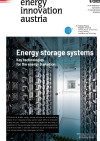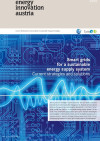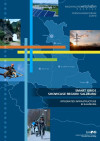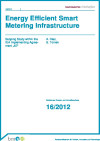Suchergebnisse
OPEN HEAT GRID - Open Heat Grids in urban hybrid systems
The primary research topic of OPEN HEAT GRID was to investigate the possibilities of enforcing the feed-in of industrial waste heat into existing district heating networks. The project results show that excess heat is not for free: despite minimal variable costs, the investment costs need to satisfy usual payback periods. The analysis shows that there is no need for a regulation in the sense of a feed-in obligation or market liberalization. However, from an economic point of view, information asymmetries exist, which may lead to irrational decisions.
National Smart Grids R&D Initiatives in Europe

Results of the 1st Smart Grids ERA-Net Workshop on 3th March, 2010
Energy storage systems

Key technologies for the energy transition
energy innovation austria
5/2021
Herausgeber: BMK in cooperation with the Climate and Energy Fund
Englisch, 16 Seiten
Downloads zur Publikation
Socio-technical support model - energy vision Murau
A socio-technical support model will be created for the Region of Murau. It will be established in strong cooperation with local and regional actors, to reach a broad realisation of a network on sustainable solutions on renewable energy sources. This pilot model will also be an example for multiply.
Smart Gas Grids - Intelligent Gas Networks of the Future
The basic principles of "Smart Gas Grids" will be investigated and practical issues and deployment strategies will be studied in detail. Furthermore, together with the relevant stakeholders, a "Vision- and Strategy Paper" and a draft for a "Strategic Research Agenda" will be developed.
Long-term scenarios of the austrian electricity system
Economic analyses and scenarios of the evolution of the Austrian electricity supply system until 2050 in consideration of various technology options in order to provide energy services optimally from society's point of view.
Refrigerating plants in hotel and catering industry
To the frequent uses of refrigerating plants in hotel and catering industry was not paid a lot of attention in the way of energy efficiency so far. We are talking about plug-in cooling units and custom-made cooling equipment. Aim of the project: finding out the manner and amount of refrigeration usage, as well as the estimation of energy savings potential and measures, especially for custom-made cooling equipment.
Energy-Sponge-Bruck (Energieschwamm Bruck an der Mur)
The aim of the exploration-study for the urban region Bruck/Oberaich "Energieschwamm Bruck" or "Energy-Sponge-Bruck" was to establish clear and stringent basics for a flexible development of the future energy system. Therefore an energy development concept as well as a cadaster for short-term implementation measures had been applied. The structured, Bruck-based approach acts as framework for a general energy-conception-method, valid for small and medium urban regions with 10,000 to 20,000 inhabitants.
Efficient biogas processing with membrane technique
Production of natural gas substitute with a newly developed gas permeation technology. Optimization of the process with biogas from energy crops fermentation. Screening of new methods of online product gas quality control.
Distributed generation and renewables - Power Quality
The project will demonstrate how the integration of power electronics equipment in Distributed Generation (DG) units can actively improve the stability and quality of supply of electric power distribution networks in order to increase the penetration of DG and Renewable Energy Sources.
Self-discharge mechanisms in the vanadium redox battery
The Vanadium Redox Battery is an attractive solution to uninterrupted power supply applications. The battery is very robust and easy to use and an overall efficieny of >85% would be achieveable under conditions when self-discharge is minimized.
Energy Services as an Integral Part of the Distribution
Concept development for the implementation of efficient energy services as part of grid connected energy supply to increase energy end-use efficiency.
Smart grids for a sustainable energy supply system

Current strategies and solutions
energy innovation austria
2/2016
Herausgeber: BMVIT und Klima- und Energiefonds
Englisch, 8 Seiten
Downloads zur Publikation
Spatial Energy Planning for Smart City Quarters and Smart Regions
In the project ERP_hoch3 energy related policy research in three Austrian agglomerations (Vienna – Lower Austria, Graz – Styria and Vorderland-Feldkirch) has been done, scenarios of the current state and the target state have been modelled and calculated. The aim was to develop generic transferable recommendations for spatial energy planning in agglomerations.
Smart Grids Showcase Region: Salzburg

Integratred Infrastructure in Salzburg
Forschungsforum
2/2010
Herausgeber: BMVIT
Englisch, 6 Seiten
Downloads zur Publikation
IEA-ISGAN Working Group 5: Smart Grids International Research Facility Network (SIRFN) (Working period 2021 - 2024)
As a global network, SIRFN works to improve the understanding of smart grid technologies and to promote their development and dissemination worldwide. Austria's participation during the project period ensured the networking and visibility of the Austrian smart grid research infrastructure at a global level and provided important access to a worldwide network of leading institutions and laboratories.
Manual to realise initiatives for energy regions of tomorrow
Compilation of the manual to realise initiatives for energy regions of tomorrow; integrating the experiences generated in the winner projects, outcomes of representative energy-projects and the know-how of scientific works; distribution by multiplicators, realization of distribution activities
Potential for Growth and Exports of Renewable Energy Systems
Evaluation of mid- and longterm potential for growth and exports in various sectors of renewable energy systems. Analysis of corresponding impacts on employment and value added in Austria. Recommendations for research- and technology development.
Feasibility study of innovative absorption heat pump processes
A feasibility study of innovative absorption heat pump processes for strategic orientation and further development of heat pumping technology and its applications.
Energy Efficient Smart Metering Infrastructure

Scoping Study within the IEA Implementing Agreement "4E"
Schriftenreihe
16/2012
A. Diaz, S. Tomek
Herausgeber: BMVIT
Englisch, 87 Seiten
